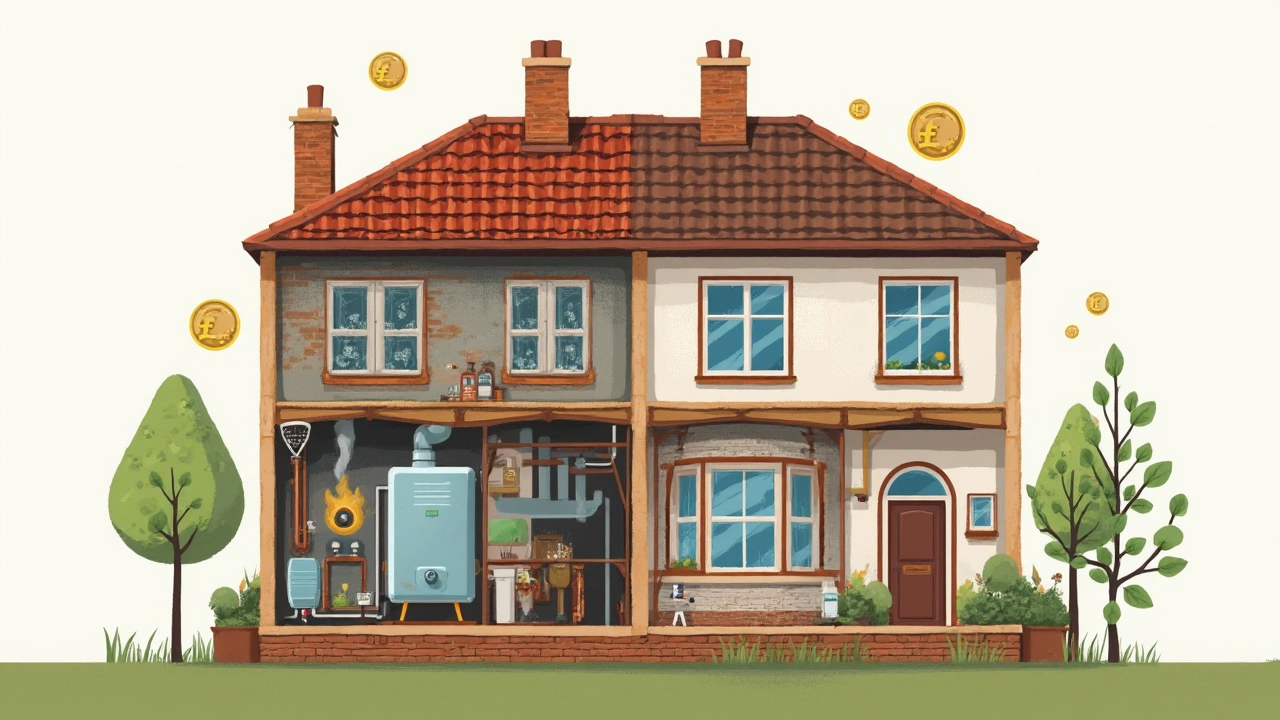They say if it isn’t broken, don’t fix it. But when it comes to a 15-year-old boiler, that advice can cost you more than you think—literally. Imagine pouring hundreds, even over a thousand pounds each year straight down the drain, just to keep that old unit clunking along. The stats back it up: energy prices in the UK have shot up by 54% since 2021, and heating eats about 55% of the average home's annual energy bill. Suddenly, keeping your antique boiler going isn’t just a quirky choice. It could be hurting your wallet, your nerves, and the environment, all in one. Most people don’t realize boilers are the engine under the hood of their home comfort. If yours sounded like a jackhammer this winter, or you spent more time cold than cozy, this is your sign to look closer. Let’s break down the real facts everyone with an ageing boiler should know—no fearmongering, just the plain truth, with some tips even your heating engineer might not mention.
The Real Longevity of Boilers: Why Age Matters
Here’s the thing—most modern combi and condensing boilers are built to slog through about 10 to 15 years of service before they start protesting with leaks, odd banging noises, or mysterious shutdowns. So, that 15-year-old boiler probably deserves a medal, but it’s not about sentiment. Reliability drops off a cliff as internal parts wear out. Even if you’ve stayed super on top of maintenance, steels corrode, plastic bits crack, and sensors get twitchy with age. Manufacturers report that at 15 years, nearly half of all boilers are running at much lower efficiency than when they left the factory—think 60-70%, compared to the 92%+ of new A-rated condensing models. That doesn’t just mean colder showers. Every missing percentage in efficiency translates directly into higher gas bills.
Have you noticed the pilot light going out more often, a need to bleed the radiators constantly, or maybe hot water taking forever? Those are classic signs your boiler is struggling. Some try to squeeze another year (or five), but hidden dangers lurk—how about the risk of carbon monoxide leaks? The Gas Safe Register found that the majority of home carbon monoxide incidents in the last decade traced back to faulty or ancient heating systems. Not worth gambling with your family’s safety, right?
Annual repair bills add up alarmingly fast too. British Gas put the average one-off emergency boiler repair at £365 in 2024, and if it happens more than once a year, well, you do the math. That doesn’t even cover the anxiety of losing heat during a cold snap—a horror anyone who’s lived through a British winter won’t forget.
Cost Analysis: Replacement Versus Repairs
This is where people get nervous—the upfront sticker shock. Replacing a boiler now costs between £2,500 and £5,000 in the UK, depending on size and extras. But before you choke on your tea, let’s see this in context. A boiler drawing 30% more gas over a winter could run up to £300-£500 in unnecessarily high energy bills per year, based on Ofgem data from early 2025. Over five years, that’s over £2,000—never mind if you get hit with enough breakdowns to match the cost of a new unit anyway.
Plus, consider new government incentives. Eco4 grants now cover up to £7,500 for certain efficient heating upgrades, especially for low-income homes. Some energy providers also offer trade-in schemes for scrapping old boilers, knocking another few hundred pounds off your bill. Run the numbers for your household: the right new boiler might actually pay for itself in just 5-6 years when you stack up the reduced bills and repair savings.
Here’s a handy cost breakdown table based on real 2025 data for a typical 3-bed UK home:
| Factor | 15-Year-Old Boiler | New A-Rated Boiler |
|---|---|---|
| Annual Gas Bill | £1,460 | £1,120 |
| Repair Bills | £350 | £60 (warranty cover) |
| Efficiency (%) | ~68% | 92-94% |
| CO Emissions | Higher | Lower |
Repairs might seem cheaper short-term, but toss in some chronic faults—failed heat exchangers, seized pumps, or a death-rattle PCB—and suddenly you’re sinking money for nothing but frustration. Not exactly a smart investment, is it?

Energy Efficiency and Environmental Impact
This part is easy to overlook—after all, you can’t see efficiency, right? Yet the difference is massive. A modern boiler uses about a third less gas for every kilowatt of heat compared to an old, inefficient model. So if your house feels draughty even though the heating’s on, blame those lost BTUs. Energy Saving Trust figures from last winter showed households switching from pre-2005 boilers cut their heating costs by an average of £340 a year and shrank their carbon footprint by nearly 1.5 tonnes CO2 annually.
There’s one more sneaky detail: old boilers leak heat through their casing and flue—sometimes enough to warm the pigeons sitting outside but not your living room. Modern A-rated models trap much more heat, and their smart controls help avoid waste by adjusting output to what’s really needed.
If you’re thinking about future-proofing, some of the latest boilers are designed to work with hydrogen blends or heat pumps as the UK grid slowly shifts away from natural gas. That makes them less of a dead-end investment when government rules inevitably tighten down on emissions for existing homes.
For anyone itching for green credentials, swapping to a new boiler is one of the most carbon-busting home upgrades (short of full insulation or solar panels). The collective impact? If every eligible UK home did this, it’d be like taking 1.2 million cars off the road, say National Grid figures.
How to Decide: Tips for Assessing Your Old Boiler
So, are you still on the fence, thinking maybe your 15-year-old boiler has another couple of winters left? There are some easy checks, even if you aren’t a heating engineer, to guide your decision:
- Check your last year’s bills. Did your gas usage spike compared to previous years, without any major lifestyle changes?
- How often did you need repairs in the past 24 months? Was it just a gasket here or there, or did you face bigger issues—like pressure drops, leaks, or control panel errors?
- Turn on the heating and listen. Odd sounds—banging, whistling, gurgling—often signal ageing or sedimented system parts.
- What label is on your boiler? If it predates the 2009 EU efficiency rules (ERP), it’s probably a G-rated unit—that means 60-70% efficiency or less.
- Ask yourself: are you planning to stay in this home for another decade? A new boiler is an investment, so it’s best for people not planning to move soon.
One practical tip: get a Gas Safe engineer out for a survey. Ask for a written efficiency check and a ballpark figure on expected lifespan left—not just a sales pitch. They can also spot hazards like internal corrosion you can’t see.
The most important step? Replace old boiler if three or more of those warning signs show up. Dragging things out past 15 years rarely pays off. As for brand—it’s not all about badges. Mainstream brands like Worcester Bosch, Vaillant, and Baxi fare best for post-sale support according to Which? magazine’s 2025 survey. Prioritize long warranties (5+ years), and make sure you get a magnetic filter fitted to protect the new system from sludge—the main killer of replacement boilers.
If you’re squeamish about the upfront cost, remember: many suppliers now offer zero-interest installment plans and free annual servicing for five years. You might end up paying less per month than you’re currently burning away in wasted gas. And if you qualify for an ECO4 or similar grant, grab that with both hands before the rules change again.
Ignore the old myths—replacing a 15-year-old boiler isn’t some sneaky trick by the heating industry. The facts are simple: better comfort, safer operation, and serious savings. Ongoing repairs and high bills aren’t a badge of honor—they’re a sign it’s time for a change.


